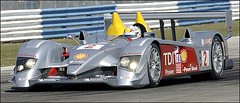A NYTimes article entitled Remaking Diesel's Image a Lap at a Time says, "European roads are bustling with modern diesel cars that do not spew stinky clouds of black smoke from their tailpipes or announce their presence with a truck-stop clatter from under the hood. But with few exceptions, American drivers cannot buy these refined models.
Not that it matters. Buyers in the United States do not clamor for these thrifty cars anyway, largely because the diesels they have known were slow, quirky and not worth the fuss so long as gasoline was cheap.
But diesels are fast becoming much cooler, and much faster. Traditional diesel vices have been tamed by new technologies, and the latest Eurodiesels offer performance similar to that of gasoline-powered sport sedans. Further evidence of the diesel's performance potential came earlier this month, when the diesel-powered Audi R10 won the 12 Hours of Sebring sports car race in Florida.
Cleaning up diesels to meet American emissions standards cannot be accomplished with the same solutions used for gasoline engines. A conventional gasoline engine compresses a mixture of fuel and air, then ignites it with an electric spark just before the piston reaches the top of its stroke. How much the mixture can be squeezed — and therefore the fuel efficiency — is limited by the fuel's ability to resist detonation, or pinging.
A diesel engine, though, compresses air only, and can thus compress it much more, raising its temperature to several hundred degrees. As the piston reaches the top of its travel, fuel is sprayed into the cylinder by a high-pressure injector; after a short delay, it ignites spontaneously. In both types of engines, the pressure created by the heat of the burning fuel drives the piston downward in the cylinder to produce rotary mechanical power at the crankshaft.
The appeal of a diesel engine is its greater fuel economy, a gain of 25 to 40 percent. European regulators allow diesels to operate under less-strict emissions standards and the benefit of a lower fuel tax in return for their ability to reduce dependence on foreign oil.
More than half of European car buyers choose diesel engines. In the United States, diesel efficiency could also help to reduce fuel imports — or allow drivers to continue their romance with large cars and S.U.V.'s despite high fuel prices.
For a time in the 1980's diesels were attractive to buyers and regulators alike because they were so fuel-efficient and because their operation, with at least 20 percent more air than their fuel requires, suppressed hydrocarbon emissions. Then it was discovered that carbon particles in diesel exhaust carry chemicals linked to cancer.
Interest in diesels waned in the United States. But high fuel costs are again making diesels attractive, despite emissions rules that limit where they can be sold."
Saturday, May 06, 2006
Subscribe to:
Post Comments (Atom)


1 comment:
I don´t think Diesel will take over. The future lies on synthetic products.
BW
Osko
Post a Comment